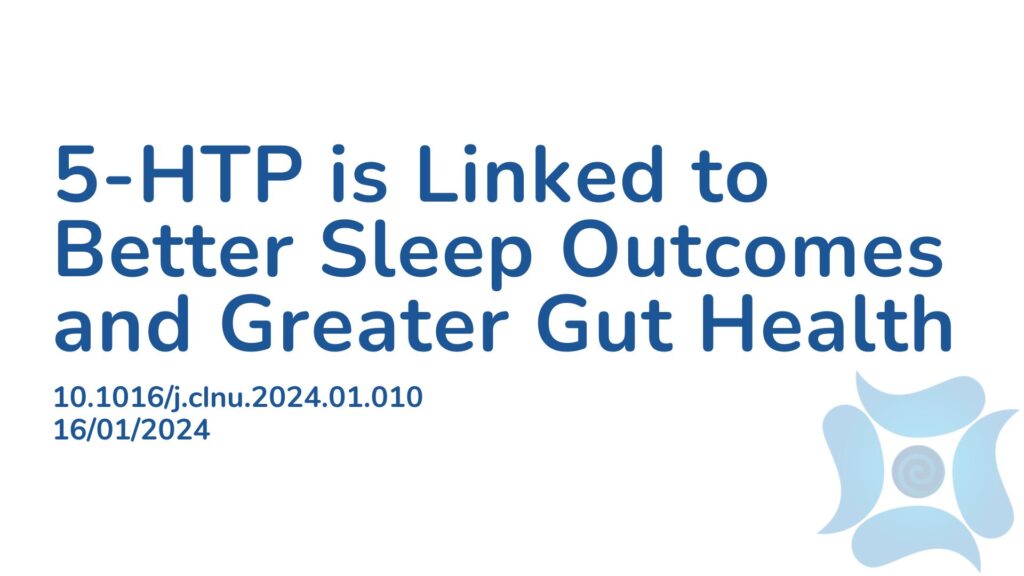Summary:
It is clear in literature that sleep quality is essential for overall health, and that consistently poor sleeping habits are linked with higher risk of Type 2 Diabetes, cardiovascular disease, mental health conditions and poor quality of life. There is also increasing evidence suggesting a relationship between gut microbiota composition and sleep quality. 5-Hydroxytryptophan (5-HTP) is a precursor of the neurotransmitter and hormone serotonin, which is involved in regulating sleep via stimulating melatonin release. However, it remains uncertain whether 5-HTP supplementation effectively enhances sleep quality in older adults. Therefore, this study aimed to evaluate the impact of 5-HTP supplementation on sleep quality and gut microbiota composition in older adults. This study is a single-blinded, 12-week randomized-controlled trial conducted in Singapore. Thirty older adults were randomly assigned to either receive daily 100 mg 5-HTP supplementation or no supplementation. Sleep quality was assessed every 4 weeks. Blood serotonin levels, urine melatonin concentration, gut microbiota composition, and stool short-chain fatty acids (SCFA) content were evaluated at baseline (week 0) and week 12. The results showed that 5-HTP supplementation demonstrated a beneficial effect on sleep quality and led to an increase in serum serotonin concentration. Specifically, at week 12, individuals classified as poor sleepers but receiving 5-HTP supplementation experienced a significant improvement in overall sleep quality. Additionally, these individuals exhibited increased gut microbiota diversity and higher abundance of SCFA-producing bacteria in the gut. The authors therefore concluded that 5-HTP supplementation can enhance sleep quality in older adults, particularly in those with poor sleep quality. Furthermore, 5-HTP supplementation was associated with improvements in gut microbiota composition among poor sleepers.
Abstract:
Background & aims: Sleep quality is a pivotal part of health and there is growing evidence on the association between gut microbiota composition and sleep quality. 5-Hydroxytryptophan (5-HTP) is known as a precursor of the sleep regulating neurotransmitter and hormone. However, efficacy of 5-HTP supplementation for improving sleep quality in older adults is unclear. Hence, the aim of this study is to assess the impact of 5-HTP supplementation on sleep quality and gut microbiota composition in older adults.
Methods: This is a single-blinded, 12-week parallel randomized controlled trial. Thirty older adults (66 ± 3 years) in Singapore were randomly assigned to either consume or not consume 100 mg 5-HTP daily. Every 4 weeks, sleep quality was assessed via both subjective (Pittsburg Sleep Quality Index) and objective (actigraphy watch) measures. A global sleep score (GSS) was obtained from the PSQI, where a GSS>5 defines as poor sleeper while a GSS≤5 defines as good sleeper. Blood serotonin level, urine melatonin concentration, gut microbiota composition and stool short chain fatty acids (SCFA) content were assessed at week 0 and 12. This study was registered in clinicaltrials.gov as NCT04078724 (https://clinicaltrials.gov/ct2/show/NCT04078724). Results: 5-HTP supplementation showed an overall favorable effect on certain sleep quality components and an increase in serum serotonin concentration. In particular, at week 12, not good sleepers but poor sleepers with 5-HTP supplementation were able to significantly improve subjective GSS (ΔSL5-HTP: −2.80 ± 1.10 min, p-value = 0.005). In addition, they showed an increase in microbiota diversity (Simpson5-HTP vs. SimpsonControl: 0.037 ± 0.032 a.u. vs. −0.007 ± 0.022 a.u.; pinteraction: 0.013) and relative abundance of SCFA producing bacteria in the gut.:
Conclusions: 5-HTP supplementation can improve certain sleep quality components in older adults and this benefit was more prominently observed in poor sleepers. 5-HTP was also able to improve the gut microbiota composition in poor sleepers.
Article Publication Date: 16/01/2024
DOI: 10.1016/j.clnu.2024.01.010




